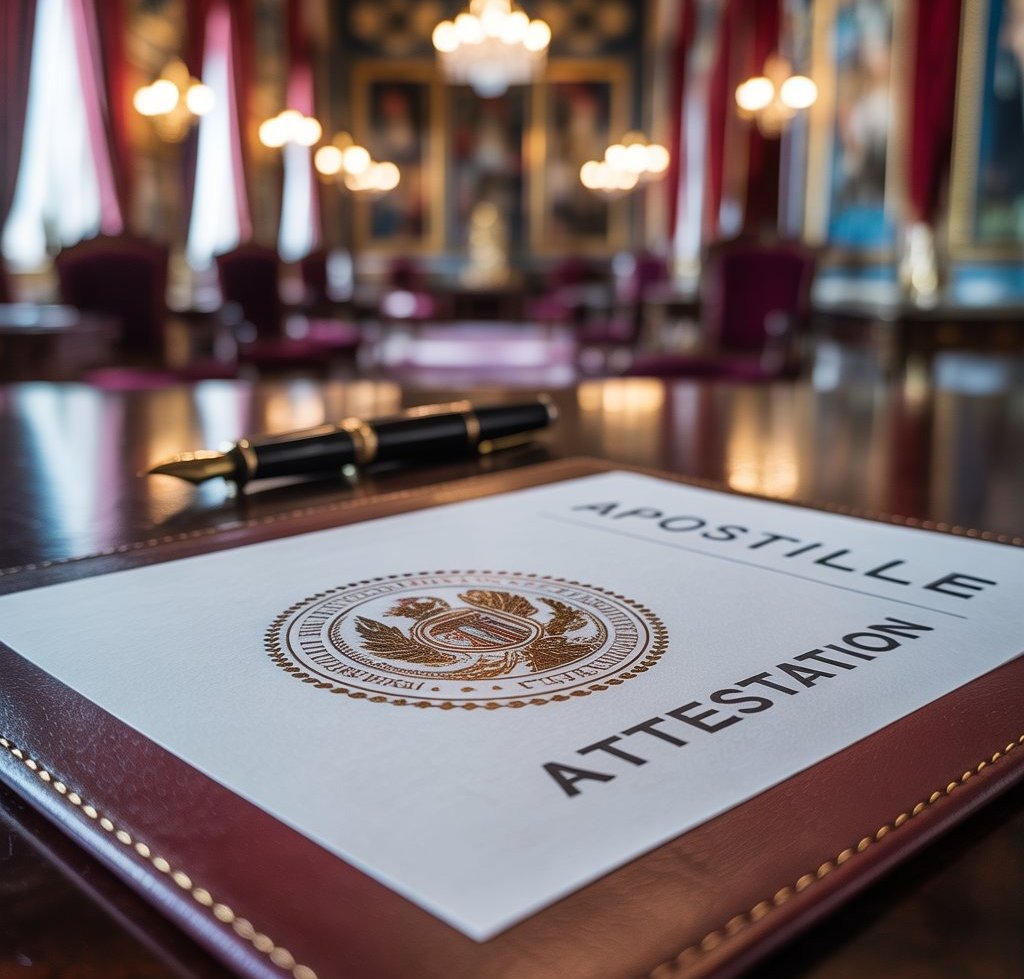Expert Guide to Document Apostille Process "how to apostille documents"
Discover the complete guide on how to apostille documents effectively. Learn about the document apostille process, requirements, and tips to ensure your documents are properly attested.
9/17/20257 min read


Introduction to Apostille Attestation
Apostille attestation is a crucial procedure that validates the authenticity of documents for international use. This method simplifies the verification process of public documents in foreign countries, eliminating the need for lengthy legalizations. The apostille ensures that a document issued in one country will be recognized in another that is a signatory to the Hague Convention of 1961. This treaty established a simplified method for international document verification by stipulating that a document can be certified with a single apostille, thereby facilitating easier cross-border transactions.
The importance of apostille attestation cannot be overstated in our increasingly globalized society, where individuals and organizations often interact across borders. Many entities, including educational institutions, government agencies, and businesses, require apostille services to confirm the validity of various documents such as birth certificates, marriage licenses, diplomas, and contracts. Without an apostille, these documents may not hold any legal standing in the foreign jurisdiction, thereby complicating matters for expatriates, international businesses, and individuals seeking opportunities abroad.
Individuals who frequently find themselves dealing with international procedures, such as expatriates, students pursuing education abroad, and professionals seeking employment in foreign countries, often require the use of apostille attestation. Additionally, organizations that operate internationally, or engage in transactions that cross national borders, must adhere to document verification standards that often necessitate the apostille process. Understanding the nuances of apostille attestation is essential for anyone involved in international affairs, documents validation, or simply navigating the complexities of living and working across different countries.
Understanding the Apostille Process
The apostille process is an essential procedure for individuals and organizations seeking to authenticate documents for use in foreign countries. This process is governed by the 1961 Hague Convention Abolishing the Requirement of Legalisation for Foreign Public Documents, which simplifies document verification. The first step involves the preparation of the documents that require apostille. Typically, these documents include birth certificates, marriage licenses, educational credentials, and corporate documents. It is vital to ensure that the original documents are duly signed by the appropriate authorities, as a document cannot be apostilled if it has not been properly executed.
Once the documents are prepared, the next stage is to verify their eligibility for an apostille. This often involves checking whether the issuing authority of the document is recognized by the designated authority in the country where the apostille will be used. Each country may have specific requirements, so it is advisable to consult the relevant authority or an experienced service provider familiar with the apostille process of different countries. Additionally, certain documents may need to be notarized before they can be apostilled, which adds another layer to the preparation process.
After confirming that the documents meet the necessary criteria, the applicant can proceed with the final submission. This submission is made to the appropriate authority designated to issue apostilles, which varies by country and, in some cases, by state. It is important to include any required fees and documentation that may facilitate the processing of the request. The processing time for obtaining an apostille can vary widely, often taking anywhere from a few days to several weeks, depending on the jurisdiction and the complexity of the request. Understanding these steps in the apostille process helps ensure that the required documents are authenticated smoothly and efficiently, safeguarding their acceptance in foreign jurisdictions.
Common Types of Documents Requiring Apostille
Apostille attestation is an essential process for various types of documents that are to be recognized internationally. An apostille is a form of authentication that verifies the origin of a public document, making it valid in other countries that are signatories to the Hague Convention. There are several common types of documents that typically require apostille for international use.
One of the most frequently apostilled documents is the birth certificate. Individuals often need an apostille for their birth certificates when they are applying for residency, citizenship, or educational purposes abroad. This authentication is crucial as it validates the individual's identity and age, essentials in many legal scenarios.
Diplomas and academic transcripts represent another category of important documents that commonly require apostille attestation. This is particularly relevant for students who intend to study or work in foreign countries. Employers and educational institutions often demand verified academic credentials to ensure authenticity, thus necessitating the need for an apostille.
Marriage certificates also frequently undergo apostille attestation, especially for couples who move abroad or for those who are applying for visas or residency permits. The apostille serves as proof of the legal status of the marriage, which is vital for various legal and administrative purposes in the foreign jurisdiction.
In addition to personal documents, business documents such as articles of incorporation, commercial contracts, and power of attorney documents often require apostille. Companies looking to operate or engage in transactions in foreign markets must ensure these documents are properly authenticated to avoid legal complications.
Failing to obtain an apostille for these critical documents can lead to delays and rejections in legal proceedings, visa applications, or business transactions. Hence, understanding which documents need apostille attestation is crucial for anyone dealing with international processes.
Where to Obtain Apostille Services
Obtaining apostille services involves several options, including government agencies, notaries, and professional apostille service providers. Each option possesses its unique advantages and disadvantages, which may influence your choice depending on your specific requirements.
The most common place to start is a government agency, such as the Secretary of State or a designated office in your jurisdiction. This method is often perceived as the most reliable and legitimate, as these agencies are authorized to issue apostilles. However, processing times can vary significantly between states. In some cases, the turnaround can take several weeks, which may not align well with urgent needs. Additionally, fees associated with agency services can differ, potentially impacting your budget.
Another avenue is utilizing a notary public licensed to provide apostille services. Notaries are widespread and can help you get the necessary documents notarized before obtaining an apostille. While this approach might provide more convenience due to their availability, it is crucial to ensure that the notary is well-versed in apostille requirements, as not all notaries offer this specialized service. Their involvement can typically expedite the process, but the lack of expertise could lead to complications, so verifying credentials is important.
Finally, many professional apostille service providers exist, specializing in navigating the complexities of the apostille process. These firms often promise quicker processing times and less hassle, which can be attractive to busy individuals or businesses. However, the costs associated with using these services can be higher than opting for government agencies or notaries. Additionally, some providers may have geographic limitations, which could restrict service availability based on your location or the specific documents you need to apostille.
Tips for a Smooth Apostille Experience
The apostille attestation process is essential for validating documents intended for use in foreign jurisdictions. To ensure a smooth experience, there are several practical tips to consider. First and foremost, gather all necessary documents well in advance. This includes original documents and any copies required for the apostille service, such as birth certificates, marriage licenses, transcripts, or powers of attorney. Being organized will help prevent last-minute stress and possible delays.
Next, it is crucial to check the completeness of your documents. Ensure that every document is signed, sealed, and duly notarized as required. Missing signatures or notary acknowledgments can lead to rejection by the issuing authority. Before submission, verify that all supporting documents, like identification proofs or prior certifications, are also included. This will facilitate a more efficient processing of your application.
It is also important to understand and comply with specific requirements of the receiving country. Different countries have varying regulations surrounding apostilled documents, including additional translations or notarizations. Researching these requirements will help ensure that your documents meet the necessary criteria, reducing the likelihood of complications during the attestation process.
Furthermore, avoid common pitfalls that can delay the apostille attestation process. One frequent mistake is underestimating processing times; it is advisable to confirm current processing durations with the chosen apostille service, as these can vary. Additionally, if you need expedited services, ensure you communicate this when submitting your documents. Thoroughly understanding the process and planning ahead will provide a more manageable and less frustrating experience. By following these tips, you can navigate the apostille attestation process more efficiently.
Potential Challenges and Solutions
The apostille attestation process can present various challenges that individuals must navigate effectively. Understanding these potential hurdles is crucial in ensuring a successful and timely authentication of documents. One common issue encountered is document rejection. Various factors contribute to this problematic scenario, including non-compliance with the specific requirements set forth by the designated authority or the submission of incorrectly formatted documents. To mitigate the risk of rejection, individuals are encouraged to thoroughly check their documents against the apostille guidelines prior to submission. Ensuring that all paperwork is in order can significantly reduce the chances of encountering setbacks.
Another frequent challenge involves the complexities of legal requirements, which can vary significantly depending on the jurisdiction involved. This complexity often leaves individuals feeling overwhelmed and unsure of how to proceed. In such cases, seeking assistance from experts who specialize in the apostille attestation process can provide clarity and direction. Professionals with experience in handling legal documentation can offer valuable insights and guidance, ensuring that applicants understand the necessary steps and requirements associated with their specific documents.
Furthermore, in situations where time is of the essence, individuals may face delays due to lengthy processing times. Engaging expedited services can serve as an effective solution to this challenge. Many certified agencies offer expedited processing, allowing individuals to significantly reduce wait times. By carefully selecting a trusted service provider, applicants can ensure the prompt completion of their apostille requirements. Thus, while the apostille attestation process may inherently involve challenges, there are practical solutions available that can streamline the journey towards successful document verification.
Conclusion: The Importance of Apostille Attestation
Apostille attestation plays a crucial role in the realm of international documents by providing a verified method of authenticating legal documents for use in foreign countries. This specialized form of attestation, facilitated by the Hague Convention, simplifies the acceptance of public documents across borders, thereby enhancing their reliability and credibility. For individuals and businesses engaged in international transactions, understanding the intricacies of the apostille process becomes indispensable.
In personal contexts, apostille attestation is often required for documents such as birth certificates, marriage licenses, or educational diplomas, ensuring that these important documents are recognized internationally. In business, apostille may be necessary for contracts, agreements, or powers of attorney, which often transcend borders and require a level of authenticity to be accepted by foreign authorities. The process can appear daunting; however, knowing the specific requirements and steps involved can significantly ease this burden.
Recognizing the unique demands of each situation—whether for personal or professional purposes—is vital in navigating the apostille process efficiently. Engaging with experts in document attestation can provide tailored guidance, ensuring that all necessary documents are appropriately handled and submitted in accordance with relevant regulations. As the world becomes increasingly interconnected, the importance of apostille attestation cannot be overstated. It not only facilitates smoother international dealings but also reinforces legal protection in transnational contexts.
To streamline your apostille journey and maximize your chances of a successful application, seeking professional assistance is advisable. This proactive approach can save time and reduce the potential for errors, allowing you to focus on your personal or business objectives with greater peace of mind.
Expert
Your trusted partner for document attestation services.
Contact NOw:
Support
+91 9210776391
© 2025. All rights reserved.
